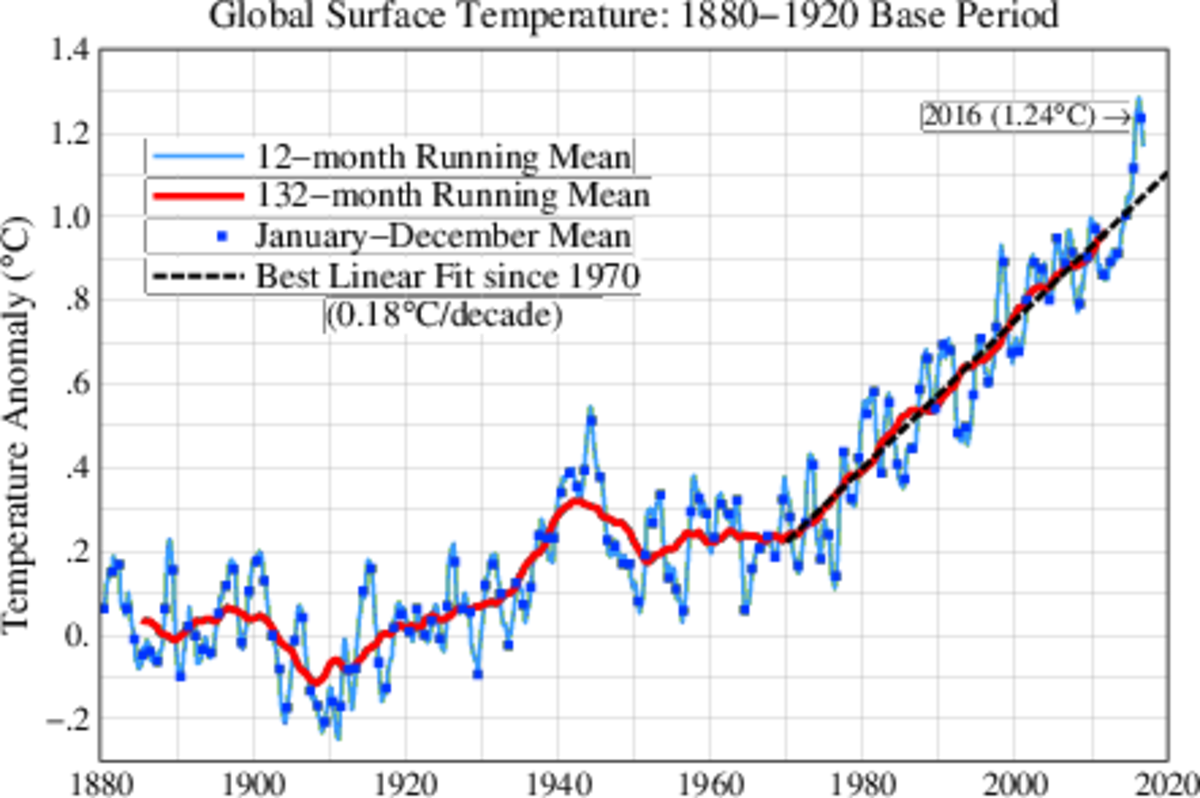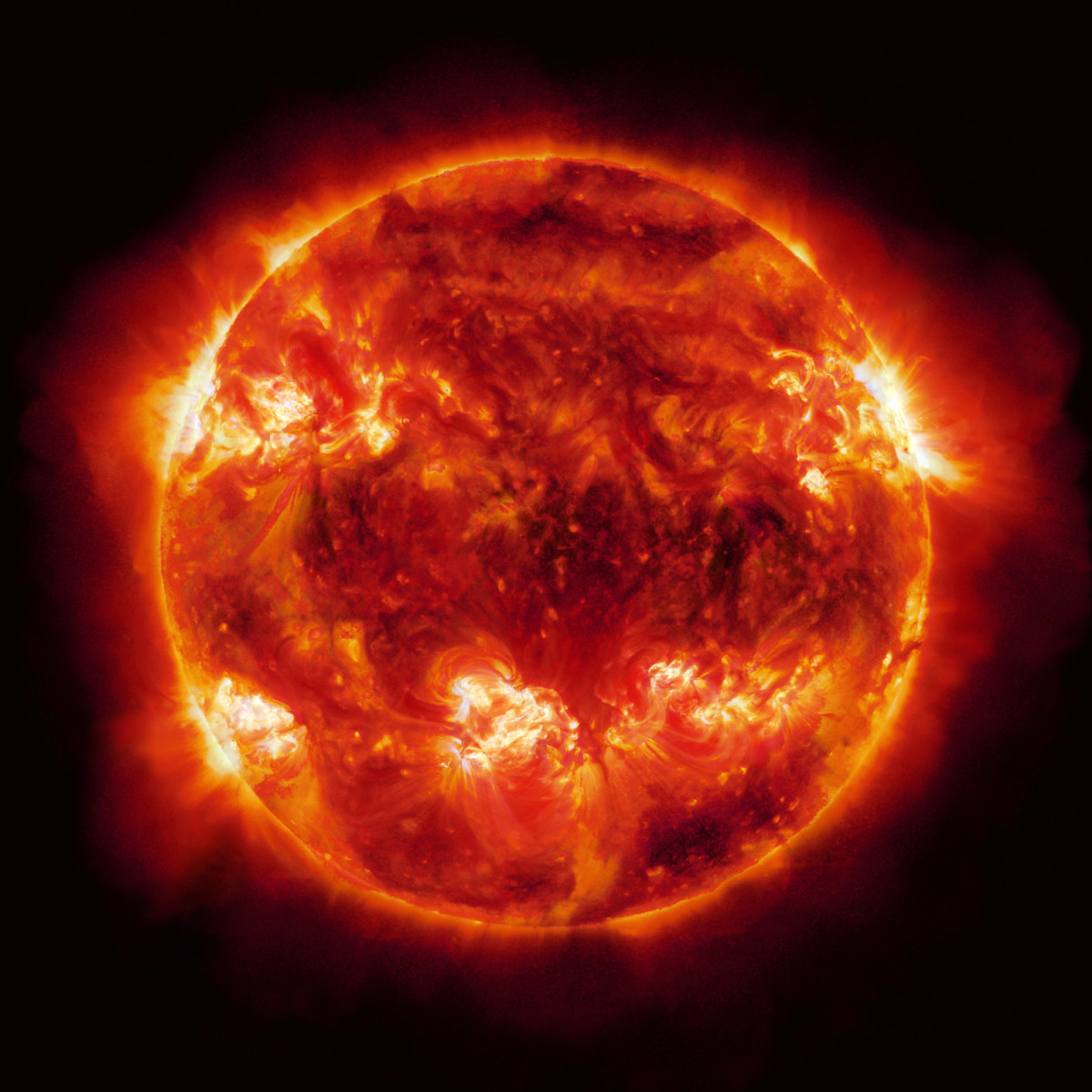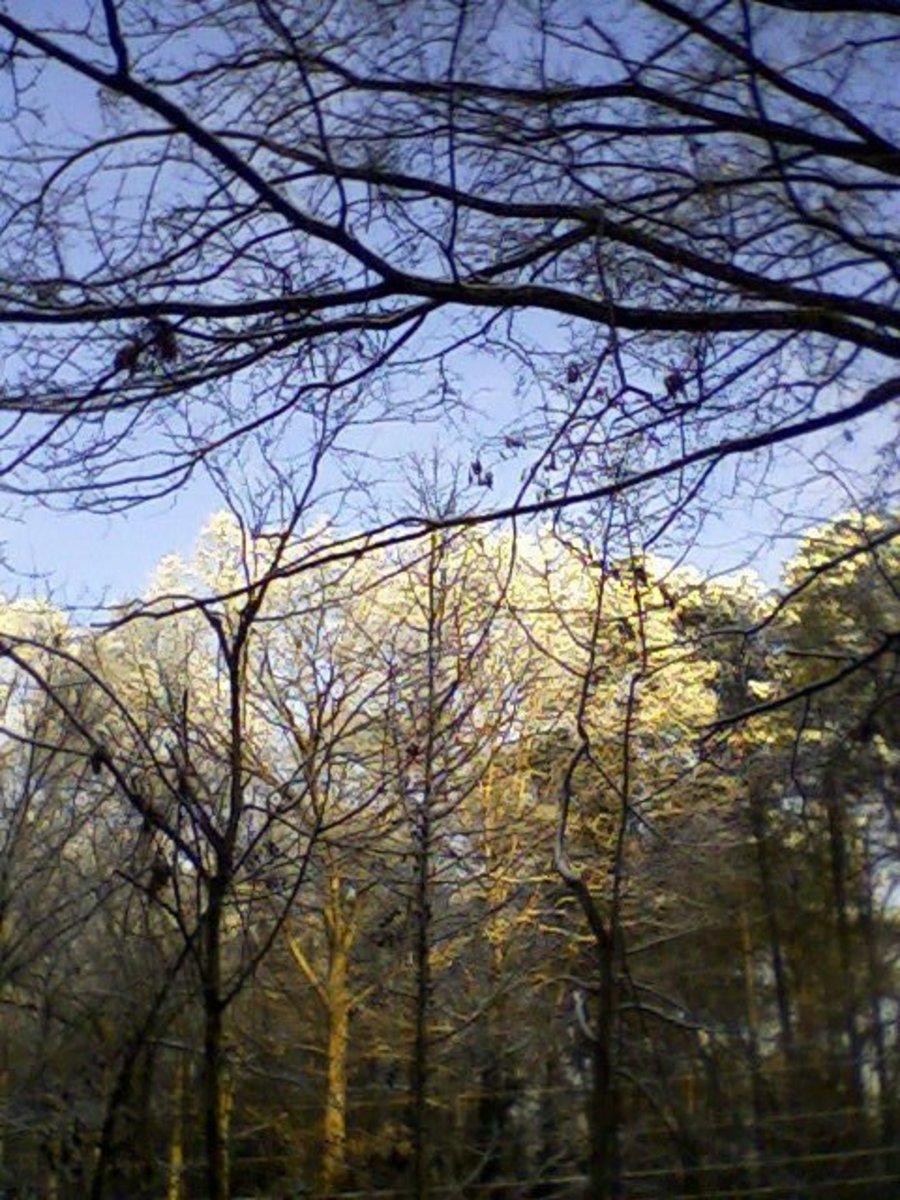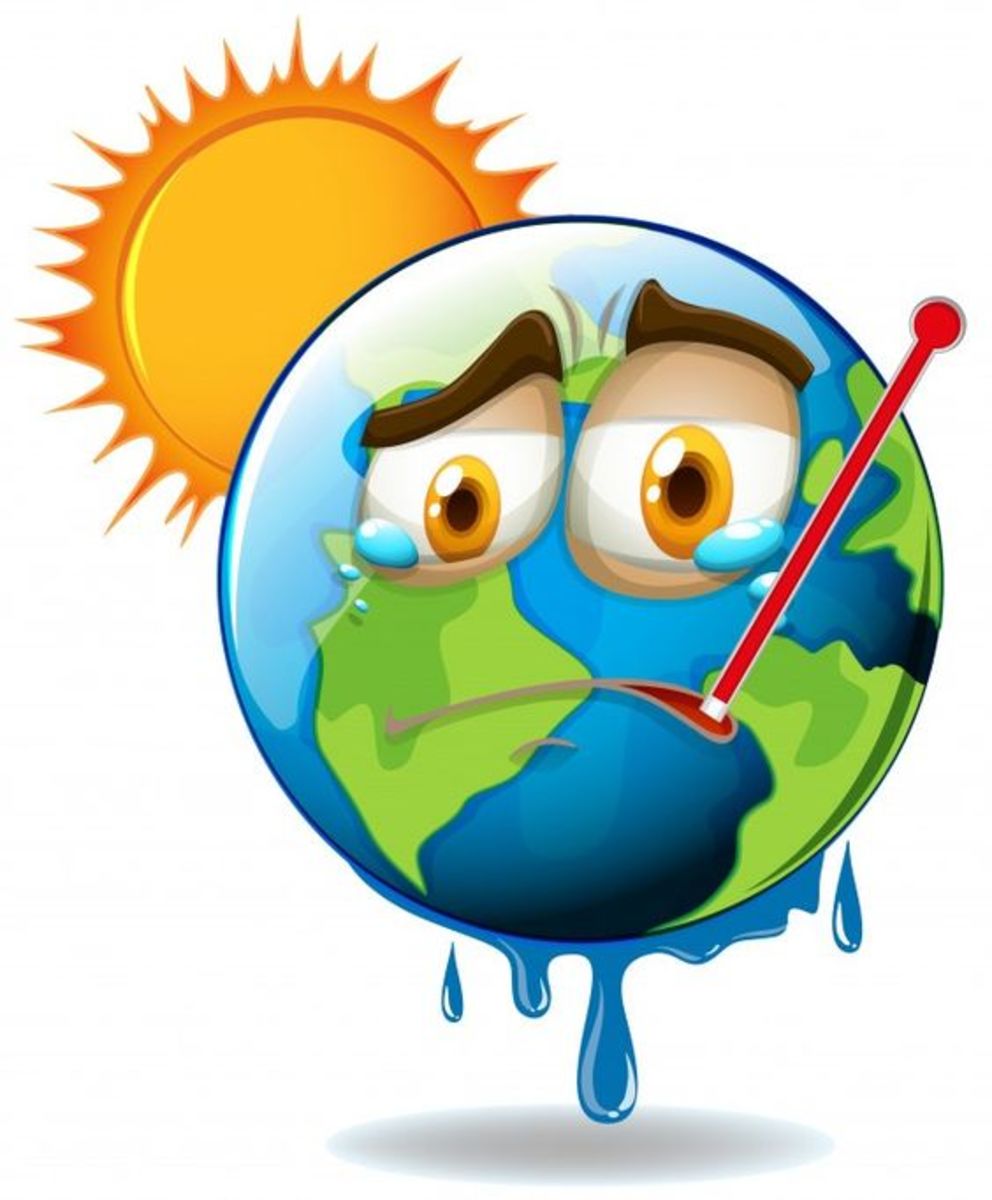Reading Bias - Global Warming Hoax - Antarctic sea ice
February 13, 2011
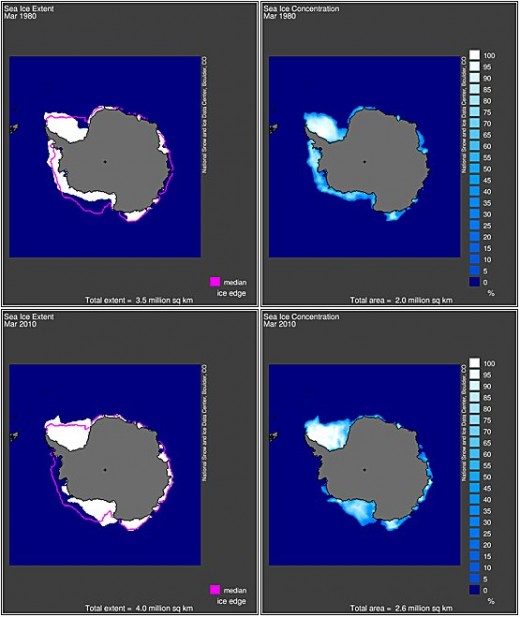
Exercise 2
This is the second of a series of articles examining bias in online content. Global Warming Hoax is a website dedicated to "Refuting the Myth of Man-made Global Warming". The specific article I am going to look at in this exercise is called "Antarctic
Sea Ice for March 2010 Significantly
Greater Than 1980". The first exercise in this series looked especially at how provocative words are used to illicit an emotional response. This exercise is more concerned with the importance of accuracy when writing about science. The images above were presented as evidence in the "Antarctic sea ice..." article. The article being examined will be in boxes to the right. I have gone through striking out sentences which contain bias and highlighting parts for explanation.
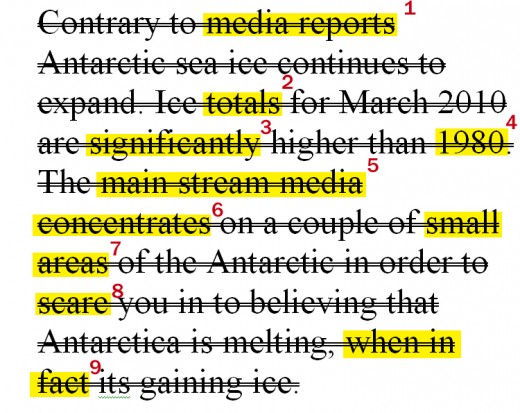
Paragraph 1
1. Which media reports? All of them? That is an impossible claim to support - not that any attempt at all was made to do so.
2. "totals" is an inappropriately vague term. To me total would imply mass, yet even concentration, which may describe size, doesn't necessarily accurately describe mass. Regardless, the information being provided only shows extent and coverage, and so are the only variables that the author can make a claim about. Additionally, the evidence provided only relates to sea ice, not to all ice. Therefore the appropriate phrase would be "Sea ice extent and concentration for March 2010..."
3. In science a claim of "significance" generally means statistical significance and if you make such a claim you should support it with the statistical evidence.
4. Though the provided graphs do show data as being from Mar 1980, he should say so in his text as well. Just saying 1980 is sloppy for science.
5. Who or what is the "main stream media". Again this is an impossible claim to support.
6. Maybe there is a reason they concentrate on these specific areas.
7. "Small" does not mean insignificant.
8. Unless they are wearing scary outfits while reporting, it is my choice to be scared or not based upon the given evidence. While they MAY be trying to misinform me, the whole trying to scare me bit seems a little dramatic.
9. Proclaiming that everyone in the media is wrong and you are "in fact" correct without providing any evidence is ridiculous.
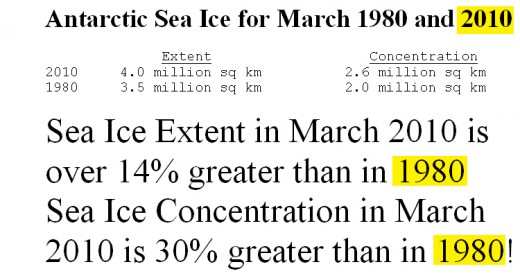
Paragraph 2
Once again he fails to specifically mention the dates in question being in March. In scientific writing, accuracy is mandatory - I'm not just being nit-picky.
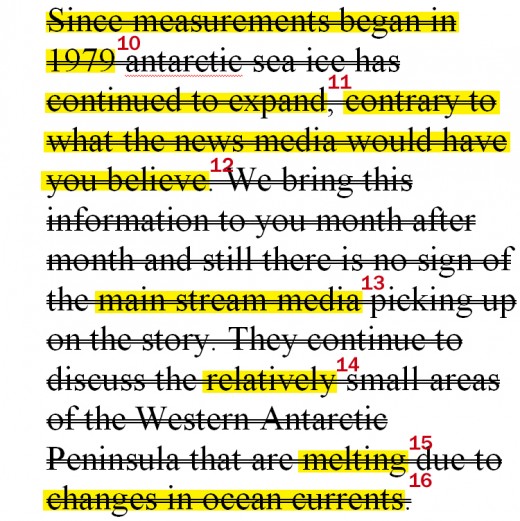
Paragraph 3
10. What measurements? Not a big deal, but again, sloppy.
11. "Continued to expand" means it was expanding before, yet you just said we weren't measuring before. I know what he means to say is simply that sea ice has expanded since 1979, but that is not what he said.
12. Vague over-generalization of the news media and their agenda once again.
13. see 12.
14. Who decided, and how did they decide these areas were "relatively small"? And what are they relatively small in comparison too? Even if they are relatively small, that does not necessarily mean they are unimportant.
15. So, some parts are melting? Isn't this important?
16. So, there are changes in ocean currents? Isn't that important too?
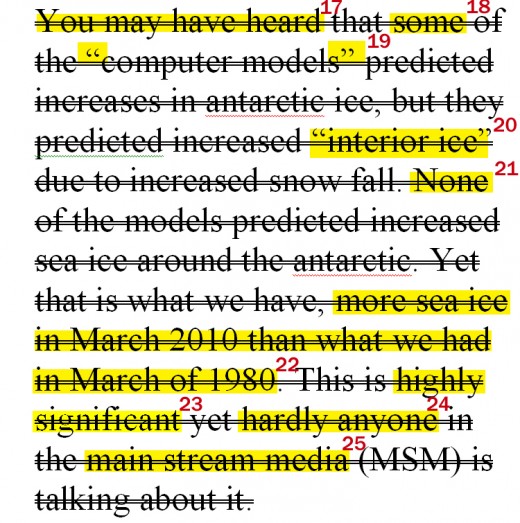
Paragraph 4
17. Okay, this is nit-picking. There is no point in saying "you may have heard". Just start the sentence as "Some of the computer models..."
18. Why is he only mentioning "some" of the models? What about the others?
19. I am not sure why he has "computer models" in quotes.
20. Same issue. Why is this in quotes?
21. None of what models? None of ANY of the models, or none of SOME of the models he mentioned earlier.
22. This is important. A lot of environmental measurements have a high level of variance (a line of the data on a graph swings up and down a lot). You can only determine trends when you have enough data points. The more data points you have will generally give you greater confidence in predicted a trend. Comparing individual data points, as this article does, can be extremely misleading (comparing a peak to a valley for instance). Comparing March 2010 to March 1980 says absolutely nothing about the overall trend. It is entirely possible that March 2010 was a peak and March 1980 a valley.
23. Why is it highly significant? If true, it is scientifically significant because it means the models aren't good enough, but how exactly is it significant to the authors thesis that global warming is a hoax?
24. So someone has mentioned it?
25. MSM again.
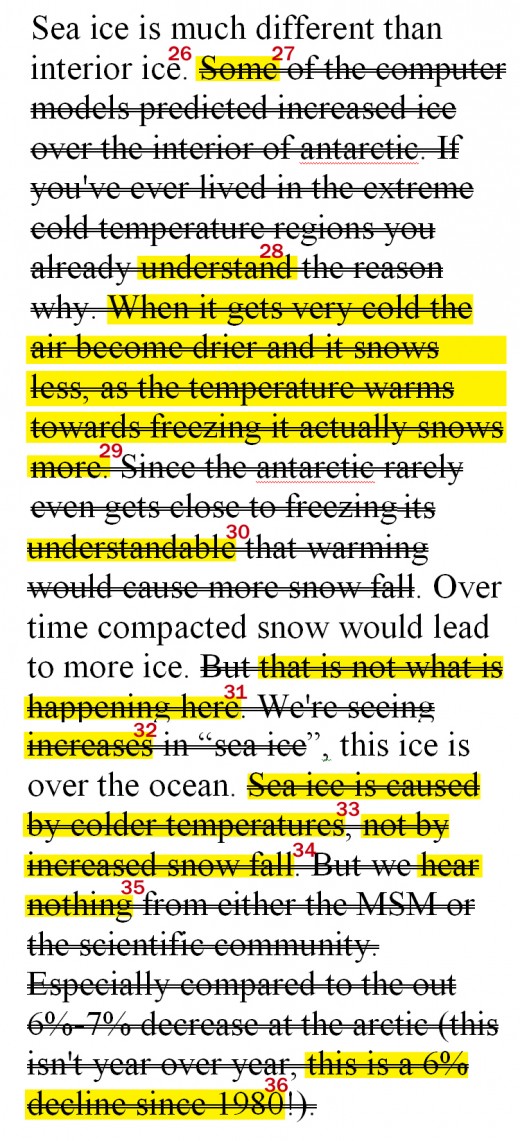
Paragraph 5
26. This sounds true but why does it matter. Maybe he is going to get to it so I'll leave this one alone.
27. Again, by saying some it makes his point essentially useless. Is some 4 out of 100 or is it 13 out of 17? It matters. Also, what did the other models predict?
28. Living in a particular region, might give you a fairly intuitive understanding of local weather patterns, it does not make someone a meteorologist. Similarly, living in cold regions does not make someone an expert on the Antarctic. It is a desert for instance, which makes it different from many places people live.
29. Actually, all other things being equal, warmer air over the Antarctic should result in less snow. Warmer air can hold more moisture so less would fall. Of course it is nowhere near this simple. Weather is a result of a complex set of variables; air and ocean currents/temperatures, cloud cover, etc. Licking your finger to determine wind direction can be useful, it is far too imprecise and simplistic for rigorous scientific investigation. There is a reason people spend their entire lives studying meteorology. There is a reason they use complex computer models to try and explain these systems.
30. No, I am sorry it isn't.
31. He just got done describing how models have predicted increased snowfall on the interior of the content. He then says that is not what is happening and yet nowhere has he shown, or provided evidence that it isn't.
32. All that he has shown is that there was more sea ice in March 2010 than in March 1980. "Seeing increases in sea ice" suggests a historical trend for which he provides NO evidence.
33. This sentence bothers me more than any other in this article. First of all, "colder temperatures" doesn't mean anything without a reference to what it is colder than. 60º is colder than 90º and so in that context would be a colder temperature, that doesn't make it a temperature that would be likely to see the formation of sea ice.
Secondly, scientists are in general extremely cautious with the words they use which assign definitive relationships; such as "significance" which I mentioned earlier. Another such word is "caused" which implies a direct and inevitable relationship. Even if the author had said something which made some sense, such as "below freezing temperatures cause sea ice," you would still not want to use the word "cause". Temperatures are only one of many variables that together comprise an environment in which sea ice may or may not form. Other important variables include salinity and water surface characteristics. Unless you know for certain, all you could really say is that decreasing temperatures might make the formation of sea ice more likely.
34. It seems like increased snowfall would increase sea ice. Maybe it isn't the main determinant, it still could play a role. I just don't know and he provides no evidence either way.
35. Impossible claim.
36. He says 6% like it isn't a lot, but how do we know if it is or isn't.
Conclusion
19.5 out of 26 sentences crossed out. 75% bias.
36 explanations out of 26 sentences. 1.4 explanations/sentence.
This is a terrible piece of writing. Let's look at the three main claims the author makes.
1. Global media conspiracy. Proving this would require an enormous effort. He has provided no evidence at all.
2. Sea ice is increasing. As already mentioned, no evidence is provided to show trends in sea ice change. Two data points do not establish a historical trend.
3. Models have been wrong. Not enough evidence has been provided to support this claim or even attempt to evaluate it. Even if the models have been wrong that does not mean the theory is wrong, and it certainly isn't evidence of a global misinformation conspiracy. A model can be wrong simply because it isn't good enough to describe the complex variables it is examining. Someone who genuinely is interested in truth would want to know why a model wasn't working. The author in this case doesn't seem to have any interest in that. Their only concern seems to be to discredit the models.
There are lots of things which matter when writing about science. I'd like to point out three.
1. Accuracy. The sloppiness of this article in using words like "totals" and not specifically mentioning dates is unacceptable.
2. Evidence. Ideally, no claim should be made without providing proper evidence. This isn't an academic journal so I wouldn't hold it to that high of a standard, but this article makes pretty substantial claims with virtually no evidence. The discrepancy is just too great.
3. Statistical honesty. Statistics are tough. It is another topic to which people spend their entire lives. Sometimes statistics are used incorrectly and sometimes they are not as good as they could be. Using two data points as evidence of a trend might work in 9th grade science, in this context it is hard to accept as anything but intentional deception.
I generally don't like condemning an entire site for one poor article but this one is so egregiously bad I would have a hard time taking any other content from the site very seriously. And with the plenitude of alternative content available, why should I bother?

